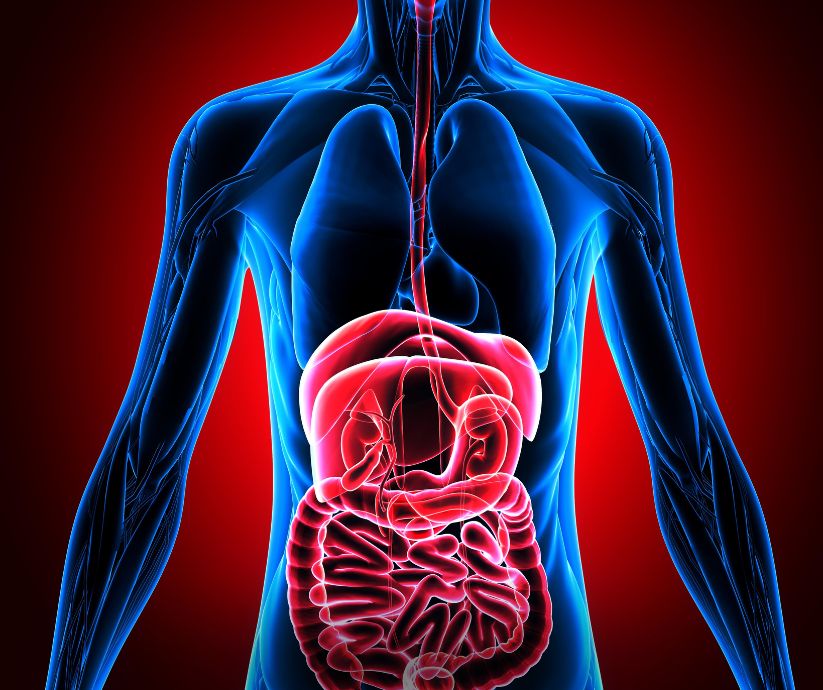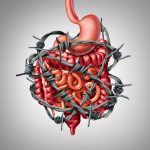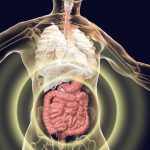Samantha Pryor, ND
Constipation is defined as having fewer than 3 bowel movements per week, often accompanied by difficulty defecating. As naturopaths, we agree that daily Bristol Type 4 bowel movements that feel complete are the most indicative of a healthy digestive system. Unfortunately, many patients do not experience this: constipation is the most common digestive complaint in United States ambulatory centers.1
According to the Rome IV criteria, a patient must experience at least 2 of the following symptoms over the preceding 6 months to be diagnosed with constipation1:
- Fewer than 3 spontaneous bowel movements per week
- Straining for more than 25% of defecation attempts
- Lumpy or hard stools for at least 25% of defecation attempts
- A sensation of incomplete defecation for at least 25% of defecation attempts
Additionally, the patient must rarely experience loose stools without use of a laxative and must not meet Rome IV criteria for irritable bowel syndrome.
Digestion is controlled by multiple body systems. The gastrointestinal system has its own intrinsic neural plexus that allows for some autonomy in digestion and waste removal.2 The central nervous system provides extrinsic control, modulating digestive functions.2 The sympathetic nervous system predominantly inhibits gastrointestinal peristalsis and mucosal secretions.2
One way to assess a patient’s autonomic nervous system (ANS) function is through heart rate variability (HRV), which is modulated by the ANS with inputs from both the sympathetic and parasympathetic systems. Younger individuals typically exhibit stronger HRV due to respiratory sinus arrhythmia, primarily mediated by the vagus nerve. A study by Liu et al used high-resolution colonic manometry and HRV analysis on 14 patients with refractory chronic constipation, comparing them to healthy subjects.3 The study concluded that all of the patients with refractory chronic constipation had either high sympathetic tone or low parasympathetic tone except for a pediatric patient.3 This finding highlights the role of modulating the ANS to address refractory chronic constipation.
As seen in the following case, biofeedback to modulate HRV aids in constipation treatment and anxiety management.
Case Presentation: Demographics and History
Victoria, a 27-year-old woman, presented with chronic constipation for 4 years. She had been using bisacodyl laxative (1-3 tablets HS), linaclotide (72 mg QD), and psyllium (1 teaspoon BID). Without those medications, she could go 11 days without a bowel movement, and her stools were classified as Bristol Stool Chart Type 1, passed with significant straining. She also reported bloating 1 to 2 times per week. A colonoscopy in 2023 showed no abnormalities. Additionally, she had experienced anxiety since high school and had been prescribed hydroxyzine pamoate (25 mg 1-2 times per day PRN), which she had been taking twice daily for 2 weeks before our first appointment. Victoria was adopted and her family history was unknown. She acknowledged striving for perfection and working a stressful job as an accountant.
Laboratory and Diagnostic Data
Asmall intestinal bacterial overgrowth (SIBO) testing kit was ordered to evaluate intestinal methanogen overgrowth, a common cause of constipation due to methane’s effect on intestinal motility. Six months earlier, Victoria’s complete blood count, complete metabolic panel, and thyroid stimulating hormone levels had all been within normal ranges, so those tests were not repeated. The SIBO test revealed hydrogen-dominant SIBO with low methane levels, contrary to our expectations.
During her second appointment, I conducted a baseline psychophysiological stress profile assessment using the emWave® Pro Plus by HeartMath. The reading showed a high heart rate at 100, dropping to the high 80s in a very incoherent pattern. However, once I introduced her to heart-focused breathing (HFB), her HRV became more coherent, with heart rates ranging from 92 to 80 bpm and an overall coherence score of 0.8. Cardiac coherence is a sine wave-like signal with a narrow, high-amplitude peak in the LF region of the HRV power spectrum.4 This coherent state has been correlated with a sense of well-being, with improvements in cognitive, social, and physical performance.4
Treatment for the Anxiety and Constipation
The First Appointment
I recommended:
- HLC MindLinx: 1 capsule per day
- GABA Trex: 1-2 chews as needed for anxiety, less than 3 times a day
- Alternate breathing, 10 breaths per nostril twice a day
- Counseling, for which I referred her
- Spiced bitters: 4 sprays on the tongue before meals, 3 times a day
- Magnesium citrate: 400 mg taken twice nightly
- Increased fiber in the diet
The Second Appointment
The SIBO test results were reviewed, and the patient was recommended the BiPhasic SIBO Diet Phase 1. She was also prescribed:
- Digestive enzymes: 2 capsules twice a day with food
- IG 26 DF: 2 capsules twice a day without food
Her HRV analysis showed that HFB improved her coherence, but her baseline pattern remained incoherent. She was advised to practice HFB for 1 minute twice a day, continue the treatment plan for the SIBO, and return in 4 weeks for another biofeedback session.
The Third Appointment
Victoria was compliant with the BiPhasic SIBO Diet Phase 1, supplements, and HFB. She reported significant improvement in her anxiety, and reported that other people had noticed her improved mood. She had not needed hydroxyzine pamoate in the past month.
She was advanced to BiPhasic SIBO Diet Phase 2 and prescribed:
- Berberine: 2 capsules twice a day without food
- Fluconazole: 2 capsules twice a day with food
- Motility activator: 1 capsule daily with food
- Spiced bitters, magnesium, and HLC MindLinx: continue as before
During this visit, I recommended that she try to limit bisacodyl to 1 tablet every other night. She was also taught the Quick Coherence Technique (QCT), and recommended to practice it for 1 minute twice a day. Her HRV coherence improved to 0.9, but her baseline remained incoherent.
The Fourth Appointment
The patient was compliant with BiPhasic SIBO Diet Phase 2 and supplements. She also did the QCT on most days and reported it was “helping me to stay calmer and helping my gut to feel better.” I introduced her to The Depletion to RenewalTM plan, which allowed her to realize she was in an aroused anxious state for the majority of time, while her goal was to be more peaceful and content. Victoria also reported that her bloating improved. Her bowel movements decreased after 2 weeks of taking bisacodyl every other day, to 3 per week. She was encouraged to use QCT in stressful situations with eyes open and was taught the Heart Lock-In® Technique (HLIT) and recommended to do 5 minutes daily to help with emotional restructuring. Her HRV improved with HLIT, though her baseline coherence remained at 1.0. She was recommended to continue the same treatment plan with minor adjustments; to incorporate probiotic foods; to eat more diverse foods that had been removed on the BiPhasic SIBO Diet; and to return to Phase I if she becomes symptomatic. In addition:
- Turkey rhubarb (Rheum palmatum) tincture (1:4): 1 dropperful BID
- Motility activator: 1 capsule daily with food
- Magnesium citrate: 400 mg once nightly
- Return in 4 weeks to continue biofeedback training and treatment to improve constipation
The Fifth Appointment
By this visit, the patient’s HRV coherence had improved to 1.3. She had been using QCT with her eyes open in stressful situations and reported much more contentment and improved digestion. She had not used bisacodyl since her last appointment and was having daily bowel movements, mostly Bristol Stool Chart Type 4. On 2 occasions, she needed to to use 1200 mg magnesium citrate to stimulate a bowel movement. She had added many foods back to her diet with no indigestion or bloating. Because she was leaving the country for several months, the plan was to wean off all supplements—except 1 teaspoon psyllium and 1 capsule magnesium citrate 400 mg hs—over a 4-weeks period. If she did not have a bowel movement for even a day, she was instructed to use the 1200 mg magnesium citrate and 2 teaspoons of psyllium hs that day to have a bowel movement the next day. She was recommended to continue HLIT 5 minutes daily and QCT as needed for stressful situations.
Gut Health and Mental Health
At the initial appointment, the patient was prescribed the probiotic HLC MindLinx, which contains 250 mg of glutamine per capsule. Glutamine is an essential fuel source for enterocyte function and promotes proper tight junctions in the intestines. In order to show the importance of proper tight junctions, Zheng et al injected lipopolysaccharide (LPS) in the periphery of mice. LPS is a component of gram-negative bacteria that are mostly in our gastrointestinal tract and should not be in the periphery. This led to an activation of microglia and production of proinflammatory cytokines in the basolateral amygdala and increased the excitatory synaptic transmissions, which led a shift toward anxiety-like behaviors in the mice.5 This study demonstrated that damaged tight junctions which allow the LPS into our bloodstream can lead to increased anxiety.
The MindLinx probiotic has 12 billion viable cells of Lactobacillus and Bifidobacterium, which are both well-known bacteria that improve the health of the host. Combing the glutamine with the probiotics helped my patient by improving the integrity of her enterocytes and aiding her microbiome towards a more beneficial one that is less inflammatory with fewer LPS.
Bottom-Up Emotional Regulation
Unchecked anxiety can become ingrained, but biofeedback can help reset it through cardiac coherence training.Research by John and Beatrice Lacey showed that cardiac activity within a single cycle influences perception and cognitive performance.6 Further research by Velden and Wolk demonstrated that cognitive performance fluctuates at a rhythm of 10 Hz, modulated by afferent inputs from the heart through the vagus nerve.7,8 Biofeedback training helps individuals achieve cardiac coherence through modulation of the breath.
Conclusion
The patient’s new strategies for self-regulation have helped her deal with stressful moments. Two months after her last visit, her constipation had not returned. Using techniques such as heart-focused breathing, she was able to improve her baseline cardiac coherence. She is staying in parasympathetic mode longer, which is benefiting her digestive capacity for waste removal.

Samantha Pryor, ND, graduated from UBCNM in 2019 and completed a residency through NUNM. Serving 6 years in the United States Army as a medic prepared her for the rigors of naturopathic school, where she excelled and graduated at the top of her class. Specializing in generative medicine, nature cure, and more recently becoming a certified HeartMath provider, she is helping her patients from all over the country to improve their health.
References
- Basson MD. Medscape. Constipation. October 17, 2021. https://emedicine.medscape.com/article/184704-overview?_gl=1%2A1nwoit3%2A_gcl_au. %2AMTA4MjA0NTE2Ny4xNzI1NDc0MTA1&form=fpf. Accessed September 20, 2024.
- Browning KN, Travagli RA. Central nervous system control of gastrointestinal motility and secretion and modulation of gastrointestinal functions. Compr Physiology. 2014;4(4):1339-1368. https://doi.org/10.1002/cphy.c130055
- Liu L, Milkova N, Nirmalathasan S, et al. Diagnosis of colonic dysmotility associated with autonomic dysfunction in patients with chronic refractory constipation. Sci Rep. 2022;12:12051. https://doi.org/10.1038/s41598-022-15945-6
- McCraty R, Shaffer F. Heart rate variability: new perspectives on physiological mechanisms, assessment of self-regulatory capacity, and health risk. Glob Adv Health Med. 2015;4(1):46-61. doi: 10.7453/gahmj.2014.073
- Zheng ZH, Tu JL, Li XH, et al. Neuroinflammation induces anxiety- and depressive-like behavior by modulating neuronal plasticity in the basolateral amygdala. Brain Behav Immun. 2021;91:505-518. http://doi:10.1016/j.bbi.2020.11.007
- HeartMath Institute. Science of the Heart. Exploring the role of the heart in human performance. https://www.heartmath.org/research/science-of-the-heart/heart-brain-communication/
- Wolk C, Velden M. Detection variability within the cardiac cycle: toward a revision of the “baroreceptor hypothesis.” J Psychophysiol. 1987;1:61-65.
- Wolk C, Velden M. Revision of the baroreceptor hypothesis on the basis of the new cardiac cycle effect. In: Psychobiology: Issues and Applications. Elsevier Science Publishers. 1989;371-379.





